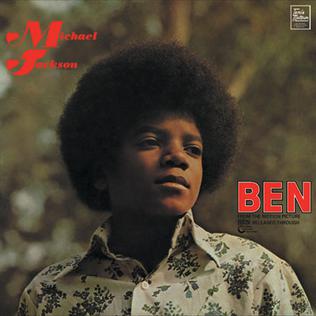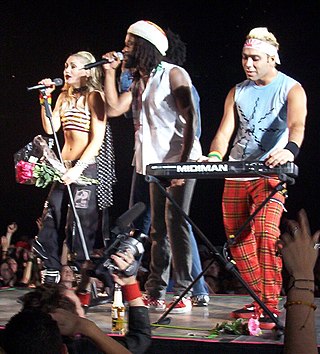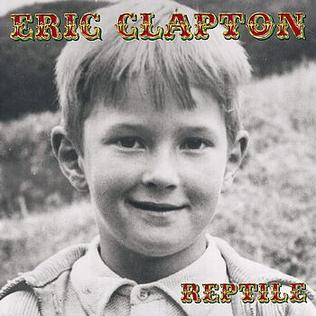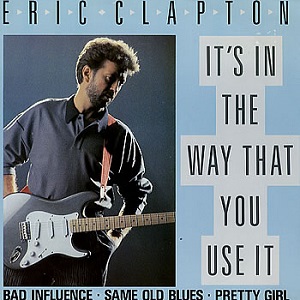
No Reason to Cry is the fourth solo studio album by Eric Clapton, released by RSO Records on 27 August 1976. The album was recorded in Malibu and Los Angeles between December 1975 to May 1976. The record went silver in the U.K.

"Layla" is a song written by Eric Clapton and Jim Gordon, originally recorded with their band Derek and the Dominos, as the thirteenth track from their only studio album, Layla and Other Assorted Love Songs (1970). Its contrasting movements were composed separately by Clapton and Gordon. The piano part has also been controversially credited to Rita Coolidge, Gordon's girlfriend at the time.

"Knockin' on Heaven's Door" is a song by American singer-songwriter Bob Dylan, written for the soundtrack of the 1973 film Pat Garrett and Billy the Kid. Released as a single two months after the film's premiere, it became a worldwide hit, reaching the Top 10 in several countries. The song became one of Dylan's most popular and most covered post-1960s compositions, spawning covers from Eric Clapton, Guns N' Roses, Randy Crawford, and more.

Ben is the second studio album by the American singer Michael Jackson, released by Motown Records on August 4, 1972, while Jackson was still a member of the Jackson 5. It received mixed reviews from contemporary music critics. Ben, however, was more successful on the music charts than Jackson's previous studio album, peaking within the top 10 on the Billboard 200 in the United States. Internationally, the album was less successful, peaking at number 12 in Canada, while charting within the top 200 positions in Australia and France.

"Tears in Heaven" is a song by English guitarist, singer, and songwriter Eric Clapton and Will Jennings, written about the death of Clapton's four-year-old son, Conor. It appeared on the 1991 Rush film soundtrack. In January 1992, Clapton performed the song in front of an audience at Bray Studios, Berkshire, England for MTV Unplugged, with the recording appearing on his Unplugged album.

American rock band No Doubt has released six studio albums, five compilation albums, three video albums, 22 singles, five promotional singles, and 21 music videos. The band was formed in Anaheim, California in 1986. After many line-up changes, it released its self-titled debut album in 1992, but its ska-pop sound was overshadowed by the popularity of the grunge movement. Following the self-released The Beacon Street Collection, Tragic Kingdom was released in 1995 and rode the surge of ska punk to become one of the best-selling albums, largely due to the international success of its third single "Don't Speak".

Behind the Sun is the ninth solo studio album by Eric Clapton, released on 11 March 1985 by Duck Records / Warner Bros. Records. It is Clapton's first collaborative project with Phil Collins who co-produced the album and played on some of the tracks. While recording the album Clapton temporarily split with his wife.

"Change the World" is a song written by Tommy Sims, Gordon Kennedy, and Wayne Kirkpatrick and recorded by country music artist Wynonna Judd. A cover version was recorded by English singer Eric Clapton for the soundtrack of the 1996 film Phenomenon. Clapton's version was produced by R&B record producer Kenneth "Babyface" Edmonds.

Another Ticket is the seventh solo studio album by Eric Clapton. Recorded and produced by Tom Dowd at the Compass Point Studios in Nassau, Bahamas with Albert Lee, it was Clapton's last studio album for RSO Records before the label shut down in 1983 as it was absorbed by Polydor Records. It received moderate reviews and achieved modest commercial success peaking at No. 18 in the UK charts.

Reptile is the 14th solo studio album by Eric Clapton. The album was produced by Eric Clapton with Simon Climie and is Clapton's first album to include keyboard work by Billy Preston and background vocals by the Impressions. The album reached the Top 10 in 20 countries, topping the national album charts in three of them. In total, the album sold more than 2.5 million copies and gained several certification awards around the globe. To help promote album sales, music network VH1 streamed the album in full on TV.

"Bad Love" is a song recorded by English singer and guitarist Eric Clapton, who co-wrote it with Foreigner's lead guitarist Mick Jones. The track was released in the UK in January 1990 as the first single from Clapton's 1989 studio album Journeyman.

"I Can't Stand It" was the first single from Eric Clapton's 1981 album Another Ticket. On the record label for the vinyl 45, its credited as Eric Clapton and His Band. It was also used for interludes on Bill O'Reilly's radio show, The Radio Factor.

"Forever Man" is a song from Eric Clapton's 1985 album Behind the Sun, released as the first single of the album. It reached number one on the Billboard Top Rock Tracks chart, becoming his second single to do so. In total, the single release sold more than 500,000 copies worldwide.

"It's in the Way That You Use It" is a song which was written by the English rock musician Eric Clapton in collaboration with The Band's guitarist and composer Robbie Robertson. The song was recorded and performed by Eric Clapton, who released the track under licence of Warner Bros. Records as the second of four singles from his 1986 studio album August in March 1987. The song, which is used as the theme tune to the Martin Scorsese film The Color of Money, was produced by Eric Clapton himself with the help of Tom Dowd, who acted as the assistant producer. The release sold more than 500,000 copies worldwide.

"I Ain't Gonna Stand for It" is the second single from Stevie Wonder's 1980 album, Hotter Than July. It reached number four on the Billboard R&B singles chart and number 11 on the Hot 100. It also hit number 10 on the UK Singles Chart. The song is famous for Wonder's imitation of a seasoned country-and-western crooner and his inspiring drumming. Charlie and Ronnie Wilson of The Gap Band provide backing vocals on the song. It was covered by Eric Clapton in 2001.

"Let It Rain" is a song and single written and released by the British rock musician Eric Clapton and Bonnie Bramlett; it appears on his 1970 debut studio album Eric Clapton. In 1972 it was released as a single as part of the promotion for his compilation album Eric Clapton at His Best

"Promises" is a single released by the British rock musician Eric Clapton in September 1978. It is part of his studio album Backless.

"Carnival" is a song written and recorded by the British rock musician Eric Clapton for his 1976 studio album No Reason to Cry. It was also released as the second and last single of the studio album in January 1977. Rob Fraboni produced the recording.

"Easy Now" is a pop rock song, written by the British rock musician Eric Clapton. He wrote and recorded the track for his 1970 studio album Eric Clapton for Polydor Records. The song was also released as the B-side to the singles "After Midnight" in 1970 and "Let It Rain" in 1972. The composition is also featured on the 1972 compilation album Eric Clapton at His Best. The recording was produced by Delaney Bramlett.
"Travelin' Light" is a song written and recorded by the Tulsa musician J.J. Cale. It was released in September 1976 on Cale's fourth studio album Troubadour under Shelter Records. It was also released as a single the same year. It was later covered by the British guitarist Eric Clapton for his 2001 studio album Reptile and helped to promote both the song and studio album on which "Travelin' Light" was first released. Athens, Georgia band Widespread Panic also covered it on their debut album, and it has continued to be a mainstay of their live show ever since.



















